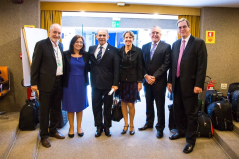
Dear friends, colleagues and compatriots,
It is such a pleasure to join you here to celebrate the 10th anniversary of the entry into force of the WHO Framework Convention on Tobacco Control.
It is a pleasure because it allows us to reflect on our successes in saving millions of lives in the decade – one recent estimate suggested that more than 7 million people are alive today because of the Convention. Just think how extraordinary that is – 7 million is more than the population of El Salvador.
This is just one statistic of success. Other examples include the cost of a packet of cigarettes increasing by more than 150%, the widespread use of graphic health warnings and the banning of smoking in public spaces by many Parties. The list is long and impressive.
Many countries made notable contributions in establishing the Convention and have since implemented many of its provisions. But the Brazilian contribution has been especially significant.
Let me once again underline the valiant work of Celso Amorim and Luiz Felipe de Seixas Correa, the Brazilian ambassadors who chaired the Intergovernmental Negotiating Body, and did so much to bring the Convention into force.
Brazil’s so-called global-health diplomacy has been supplemented by this country’s active participation in WHO FCTC working groups and expert groups and action against tobacco advertising, promotion and sponsorship, as well as the introduction of powerful health warnings and the abolition of misleading descriptions.
Brazil’s domestic policies and action on the world stage mean that other countries listen when you speak.
This country also has a powerful voice in discussions on the tobacco end-game, because it is both a leading tobacco consumer and a leading tobacco producer, with many families directly and indirectly involved in the Brazilian tobacco value chain. So when the Brazilian government takes a leading role against tobacco consumption and at the same time engages in action to support alternative livelihoods for tobacco growers, everyone knows its policies have already overcome significant internal pressure from a well-funded industry.
Insulating government policy from this wealthy and insidious enemy is a tough task in any country. Brazil has been an example to others, introducing robust institutional systems to put policy formulation beyond the reach of the tobacco industry.
The CONICQ commission is responsible for building and implementing a “joined up” agenda across government and regulatory bodies to address FCTC obligations. Chaired by the Minister of Health, with a secretariat from Brazil’s National Cancer Institute, CONICQ brings together representatives of 18 agencies and ministries. This provides an excellent example to others, a best practice to be followed.
And the federal regulatory agency, Anvisa, wields considerable powers and, critically, is financially autonomous. That has enabled it to create the strongest anti-additive legislation in the world, banning flavours which entice children into this addiction, despite fierce opposition, including legal action by the tobacco industry, which correctly saw these regulations as a serious threat.
It is inspiring too to see the research work undertaken by bodies like the Oswaldo Cruz Foundation as it pioneers evidence-based monitoring initiatives on the strategies of the tobacco industry. Only through high-quality research from the scientific community can we produce the arguments to underpin the continuing struggle to be heard. This also supports the battle to counter so-called tobacco fatigue among those who wrongly imagine the war is already won.
The tireless effort from the civil society groups under the umbrella of the Brazil Tobacco Control Alliance is also important, as these groups continue to relentlessly deploy the facts. Without their efforts, many of the tobacco industry’s lies and distortions would go unchallenged.
The Convention is a global treaty which now has 180 parties covering every continent and almost every UN member state. But action to implement its provisions are a national responsibility and that is why the actions of engaged states like Brazil are so important.
We know there is much more to do. Only through full implementation of the WHO Framework Convention can we make significant inroads against the four main non-communicable diseases, namely heart disease, cancer, diabetes, and chronic respiratory diseases.
Action on tax and illegal sales of tobacco products is also critical to tackle the smugglers who open new markets for the tobacco industry by targeting vulnerable groups, like young people.
So let me end by asking for Brazil to once again lead the way by acceding to the Protocol to Eliminate Illicit Trade in Tobacco Products.
Thank you so much for attending today and allow me to wish you all the best in your endeavours to finally end the menace posed to human health by tobacco products.